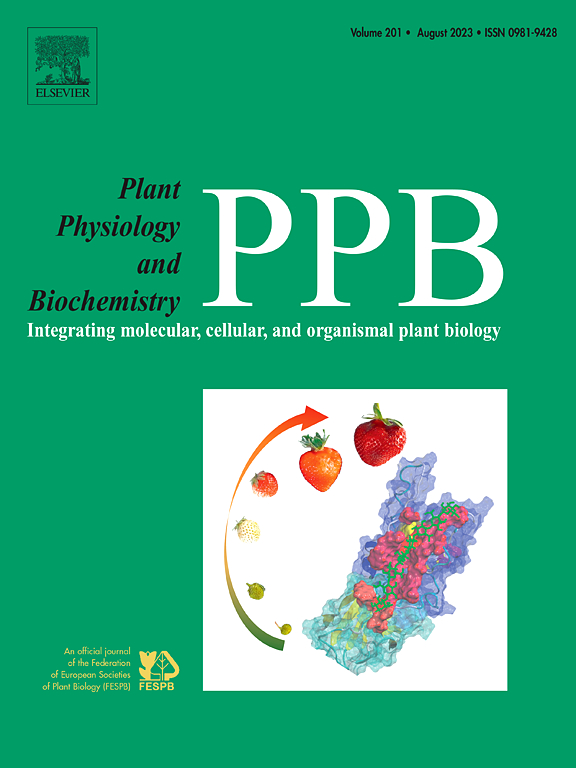Identification and functional characterization of the C2H2 ZFP transcription factor CmSUP7 in regulating melon plant growth and fruit development
IF 6.1
2区 生物学
Q1 PLANT SCIENCES
引用次数: 0
Abstract
The SUPERMAN (SUP) proteins, which belong to the single C2H2 zinc finger proteins (ZFP) subclass, participate in various aspects of gene regulation in plant morphogenesis and stress response, but their role in melon (Cucumis melo) is still largely unknown. We identified a total of 28 CmSUP genes in the melon genome, all containing QALGGH conserved domain. Collinearity analysis showed that melon had several homologous gene pairs with Arabidopsis and tomato, indicating the gene duplication events during the evolution. Expression analyses in RT-qPCR and transcriptomic data showed that CmSUPs can be divided into vegetative organ-expressed genes and reproductive organ-expressed genes. Through genetic transformation of melons, we found that overexpression of the CmSUP7 gene causes dwarfism, reduced internode length, as well as decreased leaf and fruit size. These findings indicate that the CmSUP7 gene significantly affects the melon plant growth and fruit development. Through yeast two-hybrid and BiFC assays, we found that CmSUP7 and CmMYB14 transcription factors directly interact in the nucleus. This study comprehensively analyzed the melon CmSUP family genes and revealed the function of the CmSUP7 gene in regulating melon development, which laid the foundation for further improvement in melon breeding.
C2H2 ZFP转录因子CmSUP7调控甜瓜植株生长和果实发育的鉴定及功能研究
SUPERMAN (SUP)蛋白属于单C2H2锌指蛋白(ZFP)亚类,参与植物形态发生和胁迫反应的多个方面的基因调控,但其在甜瓜中的作用尚不清楚。在甜瓜基因组中共鉴定出28个CmSUP基因,均含有QALGGH保守结构域。共线性分析表明,甜瓜与拟南芥和番茄有多个同源基因对,表明甜瓜在进化过程中存在基因重复事件。RT-qPCR表达分析和转录组学数据显示,cmsup可分为营养器官表达基因和生殖器官表达基因。通过对甜瓜的遗传转化,我们发现过表达CmSUP7基因会导致甜瓜矮化、节间长度缩短、叶片和果实大小减小。这些结果表明,CmSUP7基因对甜瓜植株生长和果实发育有显著影响。通过酵母双杂交和BiFC实验,我们发现CmSUP7和CmMYB14转录因子在细胞核中直接相互作用。本研究全面分析了甜瓜CmSUP家族基因,揭示了CmSUP7基因调控甜瓜发育的功能,为进一步完善甜瓜育种奠定了基础。
本文章由计算机程序翻译,如有差异,请以英文原文为准。
求助全文
约1分钟内获得全文
求助全文
来源期刊
CiteScore
11.10
自引率
3.10%
发文量
410
审稿时长
33 days
期刊介绍:
Plant Physiology and Biochemistry publishes original theoretical, experimental and technical contributions in the various fields of plant physiology (biochemistry, physiology, structure, genetics, plant-microbe interactions, etc.) at diverse levels of integration (molecular, subcellular, cellular, organ, whole plant, environmental). Opinions expressed in the journal are the sole responsibility of the authors and publication does not imply the editors'' agreement.
Manuscripts describing molecular-genetic and/or gene expression data that are not integrated with biochemical analysis and/or actual measurements of plant physiological processes are not suitable for PPB. Also "Omics" studies (transcriptomics, proteomics, metabolomics, etc.) reporting descriptive analysis without an element of functional validation assays, will not be considered. Similarly, applied agronomic or phytochemical studies that generate no new, fundamental insights in plant physiological and/or biochemical processes are not suitable for publication in PPB.
Plant Physiology and Biochemistry publishes several types of articles: Reviews, Papers and Short Papers. Articles for Reviews are either invited by the editor or proposed by the authors for the editor''s prior agreement. Reviews should not exceed 40 typewritten pages and Short Papers no more than approximately 8 typewritten pages. The fundamental character of Plant Physiology and Biochemistry remains that of a journal for original results.

 求助内容:
求助内容: 应助结果提醒方式:
应助结果提醒方式:


